Solar eclipse of September 3, 2062
| Solar eclipse of September 3, 2062 | |
|---|---|
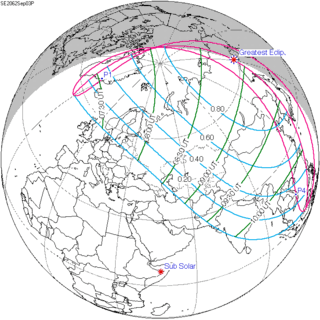 Map | |
| Type of eclipse | |
| Nature | Partial |
| Gamma | 1.0191 |
| Magnitude | 0.9749 |
| Maximum eclipse | |
| Coordinates | 61°18′N 150°18′E / 61.3°N 150.3°E |
| Times (UTC) | |
| Greatest eclipse | 8:54:27 |
| References | |
| Saros | 126 (50 of 72) |
| Catalog # (SE5000) | 9647 |
A partial solar eclipse will occur on September 3, 2062. A solar eclipse occurs when the Moon passes between Earth and the Sun, thereby totally or partly obscuring the image of the Sun for a viewer on Earth. A partial solar eclipse occurs in the polar regions of the Earth when the center of the Moon's shadow misses the Earth.
Related eclipses
Solar eclipses 2062-2065
Each member in a semester series of solar eclipses repeats approximately every 177 days and 4 hours (a semester) at alternating nodes of the Moon's orbit.
| 121 | March 11, 2062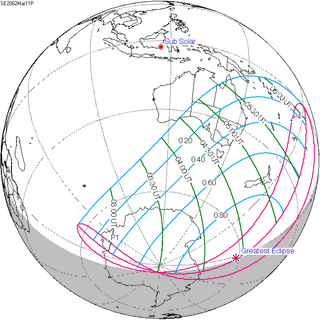 Partial |
126 | September 3, 2062 Partial |
| 131 | February 28, 2063 Annular |
136 | August 24, 2063 Total |
| 141 | February 17, 2064 Annular |
146 | August 12, 2064 Total |
| 151 | February 5, 2065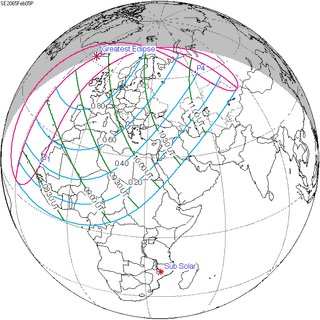 Partial |
156 | August 2, 2065 Partial |
Saros 126
It is a part of Saros cycle 126, repeating every 18 years, 11 days, containing 71 events. The series started with partial solar eclipse on March 10, 1179. It contains annular eclipses from June 4, 1323 through April 4, 1810 and hybrid eclipses from April 14, 1828 through May 6, 1864. It contains total eclipses from May 17, 1882 through August 23, 2044. The series ends at member 72 as a partial eclipse on May 3, 2459. The longest duration of central eclipse (annular or total) was 5 minutes, 46 seconds of annularity on November 22, 1593. The longest duration of totality was 2 minutes, 36 seconds on July 10, 1972.[1]
| Series members 39–49 occur between 1901 and 2100 | ||
|---|---|---|
| 39 | 40 | 41 |
 June 8, 1918 |
 June 19, 1936 |
 June 30, 1954 |
| 42 | 43 | 44 |
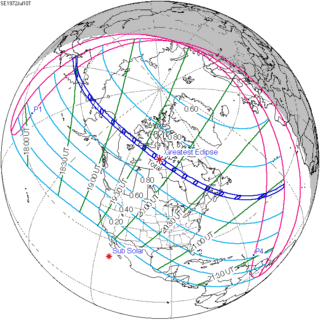 July 10, 1972 |
 July 22, 1990 |
 August 1, 2008 |
| 45 | 46 | 47 |
 August 12, 2026 |
 August 23, 2044 |
 September 3, 2062 |
| 48 | 49 | |
 September 13, 2080 |
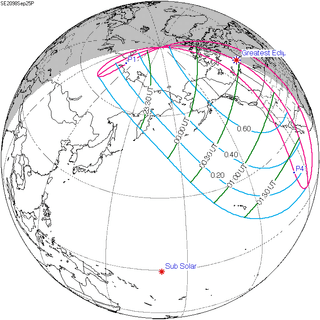 September 25, 2098 | |
References
- ↑ Solar_Saros_series_126, accessed October 2010
| Wikimedia Commons has media related to Solar eclipse of September 3, 2062. |
